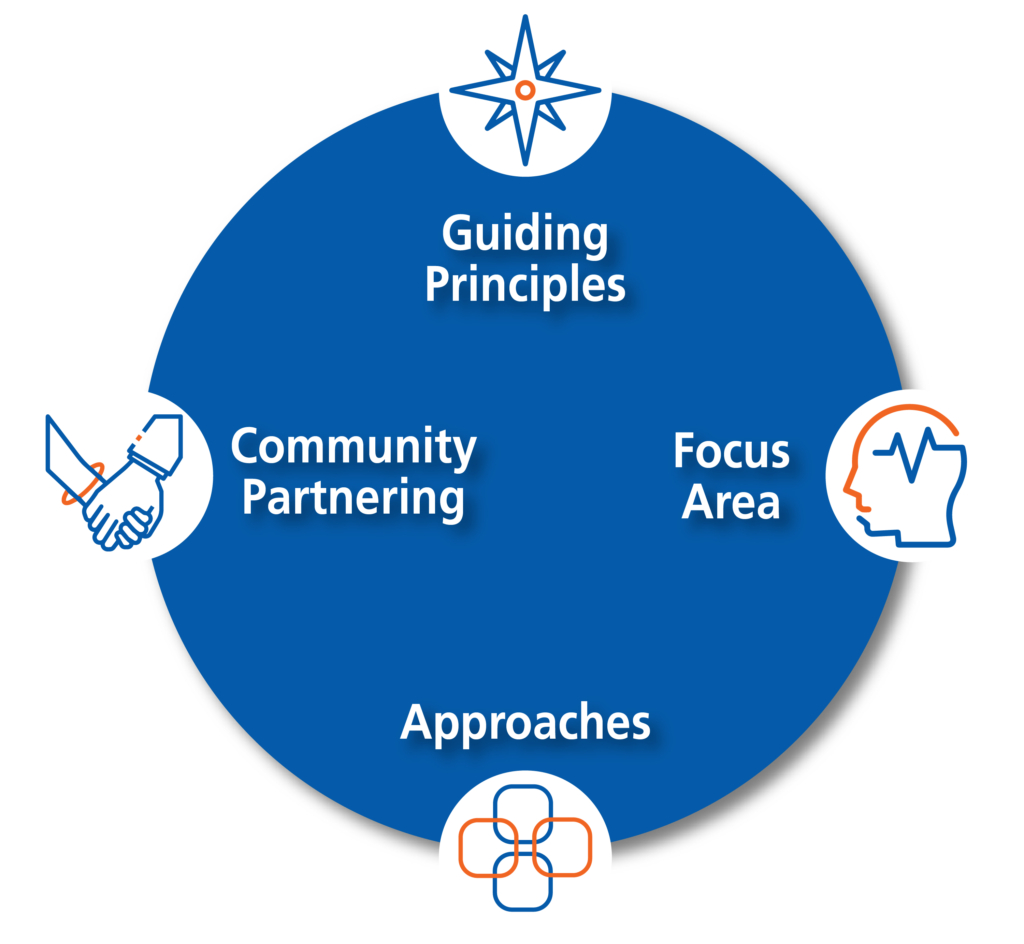Natrona Collective Health Trust (NCHT) is a new health conversion foundation that set out to co-create a strategic plan in partnership with community members in Natrona County—a rural county that contains Wyoming’s second largest city, Casper.
Formerly associated with Wyoming’s largest hospital, NCHT became the largest health conversion foundation in the state when the hospital partnered with Banner Health to become Banner Health’s flagship hospital in Wyoming. The proceeds from this transaction converted NCHT into a private health foundation with over $270M in assets.
As a new private health foundation, NCHT saw a unique opportunity to build a philanthropic institution centered on the belief that the community owns and informs their work. To determine its guiding principles, focus areas, and approaches, NCHT undertook a strategic planning process with FSG to imagine how the foundation could contribute to a stronger, healthier Natrona County for years to come.
The Process

As a brand new foundation trying to build their identity and reputation, NCHT saw the strategic planning process as a trust-building exercise in partnership with their community. They wanted to engage community voices at the beginning of their work and prioritize listening to those with lived experience with factors limiting health equity in Natrona County.
There are only 4 mental health providers that can be trusted by LGBTQ+ clients.” — Natrona County community member
To guide the board and staff in determining guiding principles and focus areas for NCHT’s work, FSG first began by examining national and local data to understand community health needs. Along with interviewing members of the board and staff, we conducted interviews and focus groups with over 50 community members and leaders that had lived experience navigating health and social services in Natrona County. We especially prioritized speaking to members of historically marginalized communities, including LGBTQ+ identifying individuals, people of color, low-income families, and youth, and NCHT compensated participants for their time and expertise.
A sense of pride in ‘figuring things out’ . . . can make it really hard for those who are struggling and need help.” — Natrona County community member
When presented with both the data and the perspectives shared in community interviews and focus groups, the board and staff acted with humility in realizing that they still had a lot to learn about the problems faced in their community—even though many of them had been born and raised in Natrona County. The county’s population has diversified rapidly in the last ten years, and the data showcased extreme disparities in health outcomes for certain populations. Many were surprised to learn that it could take someone hours to pick up a prescription from the pharmacy using public transportation, or that members of their community had been met with hostility when navigating health services due to their race, gender, or sexual identity.
We have kids as young as 10 calling [the suicide hotline].
That, for me, was shocking.” — Natrona County community leader
Particularly, both the data and the community perspectives shared made it impossible to ignore the behavioral health crisis in Natrona County. Wyoming has the highest suicide rate in the country, with extreme inequities—the suicide rate for Black individuals was 1500% higher and 65% higher for American Indian and Alaska Native individuals compared to their white counterparts in 2019.
FSG’s complete landscape assessment—composed of national and local data on health outcomes, internal stakeholder and community leader interviews, community focus groups, and analysis of existing funders and community partners in Natrona County—enabled NCHT to determine its focus as a foundation alongside the community members engaged in the process.
The Impact

Aided by FSG’s landscape assessment, NCHT decided to focus on targeting early childhood and adolescence as a pathway for improving behavioral health for Natrona County residents. Based on the needs identified through data and community voices, FSG recommended near-term, medium-term, and long-term approaches for the foundation to engage in to improve behavioral health for Natrona County residents.
NCHT emerged from the strategic planning process with four key components:
- Guiding Principles: guiding principles to inform the foundation’s decision-making and growth moving forward
- Focus Area: the issue areas, populations, and geographic areas that the foundation would work in
- Approaches: the approaches that the foundation could take to create impact
- Partnering with Community: the foundation’s role in partnering with the community
Over a year later since emerging from this strategic planning process, NCHT has been putting their guiding principles into action. Recently, NCHT decided not to partner with a nonprofit based on NCHT’s guiding principles and values; NCHT has an inclusivity statement that provides protections to LGBTQ+ community members, and they have chosen not to fund or partner with nonprofits that do not provide the same protections. This has served as a model for other organizations in Wyoming.
NCHT also remains centered on the belief that those most proximate to the problems should be most involved in decision-making around the solutions, and they continue to find new ways to ensure that community voices are represented in the foundation’s daily operations. They created a program advisory committee composed of paid community members, and currently, they are engaging youth in a participatory grantmaking process where youth are being given $240K to distribute to organizations of their choice. They have also made substantial progress in hiring and recruiting new board and staff members with diverse backgrounds and lived experiences.
Ultimately, the strategic planning process that NCHT underwent with FSG helped them to form a strong identity and focus as a new foundation trying to practice a different model of philanthropy: one centered around community ownership and voice. Today, they continue to serve as a model across their state for putting these values into practice.
When Natrona Collective Health Trust embarked on our strategic planning process, we wanted to involve community members but didn’t know where to start. The FSG team helped us expertly navigate a strategic planning process that centered community voices, and we continue to prioritize the expertise of community members in the foundation’s ongoing activities.
— Meredith Benton, CEO of Natrona Collective Health Trust
About Natrona Collective Health Trust
Natrona Collective Health Trust is a private health foundation providing support for Natrona County nonprofits and the community. Our mission is to build the foundation for lifelong health among Natrona County members by advancing the mental wellbeing of young people through trust-based philanthropy and systems change. Together we can build a foundation of health for a thriving community.





